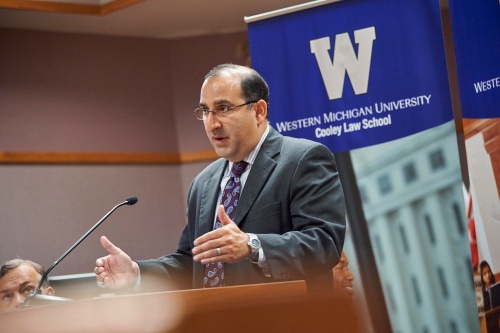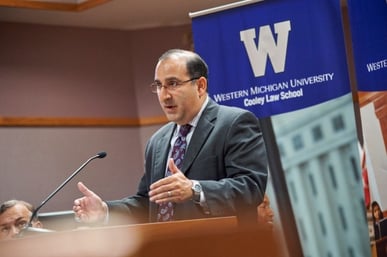Veterans Court: A blessing to troubled treatment court graduate

“I should have been in jail. I should have been dead. I should have been insane,” explained Earl “Gunny” Christensen, a veterans treatment court graduate, about his life up until he found help at the court three years earlier.
“I came to this court. I spoke my peace. They made me talk to two angels in the back of the room who showed me all the different services that were available to me to help. They got me into program after program that I didn’t know existed.”
Christensen shared his troubled past with a large group of guests and the media during a news conference on Oct. 19, 2015. The event announced a new Veterans Treatment Courts Manual for judges and featured a panel of speakers from Cooley Law School, Michigan Veterans Affairs Agency, and the State Court Administrative Office. The manual will be a valuable resource for Michigan trial court judges and staff interested in developing veterans treatment courts.
In a June 25, 2015 Michigan Veterans Affairs Agency story, Christensen admits that, “After serving his country for nearly 20 years, [he] spent the next few decades battling a new enemy – himself.” The story explained that, “Christensen, who served in the Marine Corps from 1965-68 and 1972-88, suffered from depression, alcoholism and Post-Traumatic Stress Injury for years because he ‘didn’t know help was right in front of [him] the whole time.'”
“I suffered with PTSI by myself for so long, because I didn’t know about the help that was available,” Christensen said. “The first time I went to see a therapist at the local VA hospital, he described my life. He put his finger on what I’d been experiencing for so long without even knowing it was PTSI. It’s a cycle. One problem leads to another leads to another, but it doesn’t have to be that way.”
 During the conference, Christensen made it clear that his turning point was when he became involved in the veterans treatment court. “They made me feel they cared. They wanted to help me. They didn’t want to punish me.” Today, Christensen, as a graduate of the court, is doing everything he can do to make sure others don’t go through what he did.
During the conference, Christensen made it clear that his turning point was when he became involved in the veterans treatment court. “They made me feel they cared. They wanted to help me. They didn’t want to punish me.” Today, Christensen, as a graduate of the court, is doing everything he can do to make sure others don’t go through what he did.
“I hope that this will help others,” stated Christensen. It is because of the treatment court that “I am standing up on this side talking instead of on that side talking that way,”
Veterans Treatment Courts in Michigan: A Manual for Judges is a compilation of best practices being used to address the special circumstances of veterans confronted with non-violent criminal charges and is designed to serve as a blueprint for the further development of problem-solving courts for veterans.
The Veterans Treatment Court manual, which was compiled through interviews conducted by Cooley students and edited by MVAA and Brigadier General and Cooley Professor Michael C. H. McDaniel, will serve as a tool for district and circuit court judges who do not operate a veterans treatment court, but wish to develop one in their jurisdiction. It includes suggested best practices and advice from Michigan judges who currently operate a VTC and was compiled through interviews conducted by Cooley students and edited by Michigan Veterans Affairs Agency and Ret. Brigadier General and Cooley Professor Michael C. H. McDaniel.
